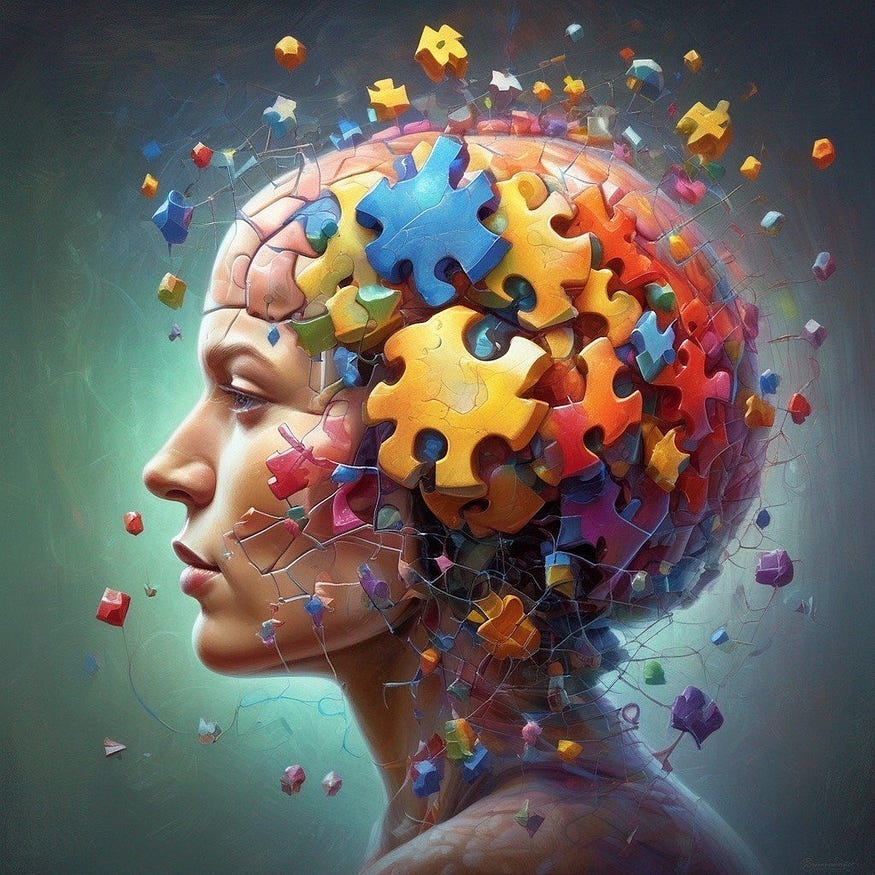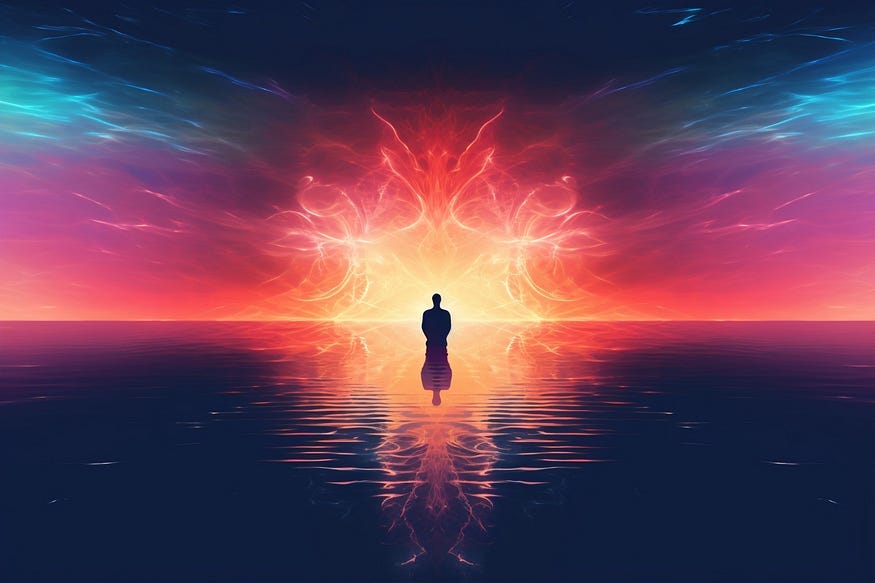Sobriety Showed Me the Connection Between Ego, Soul, and Mind
How to control Mind, access Soul, and quiet Ego
It took me precisely 87 days after choosing abstinence to admit I was an alcoholic. Merely acknowledging the problem was not enough to quiet my disease.
During my first bid with sobriety, I was utterly ignorant of my affliction, so recovery was a revelation. Similar to when I was diagnosed bipolar, there was suddenly a rational basis for my destructive behavior. The weight of that realization was strong enough to overpower alcohol’s mental hold.
However, addiction is the ultimate Ego creation feeding from the rotten fruit of the same poisonous tree.
During my previous five sober years, my alcoholism evolved under the watchful eye of my Ego. Like a cunning virus, the disease mutated into a novel strain just waiting to reinfect. Unaware of my disease’s evolution, I wrongfully assumed the original antidote was potent enough to support lasting recovery.
By the third year, I grew complacent in my relationship with a higher power, my Soul, failing to incubate the necessary spiritual components for an updated remedy.
Once I relapsed, the superbug reemerged with antimicrobial resistance, quickly metastasizing during the six years of active addiction.
As a result, my second recovery attempt was an altogether different experience from the first.
My disease was now openly confrontational.
Ego had assumed total control over my Mind. It desperately fought for survival by hijacking my capacity for logical reasoning — pushing me to the brink of insanity.
During that period, I developed an intimate understanding of Ego, Soul, and Mind pathology. As inexhaustible forces of great power, they occupy an interactive gestalt of thoughts, actions, and emotions. The more dominant force informs our decision-making and colors our worldview.
Ascertaining their subtle influences was my only path to salvation. Once I developed the discernment to expertly balance their effects, I finally experienced liberation.
Ego — Ahamkara
In Hindu philosophy, all beings are extensions and manifestations of a singular, eternal life force, Brahman. The ego, ahamkara — aham (I, or self) and kara (maker, or doer) — supports a holograph of divine separateness, maya.
Unity with Brahman is our innate and most tranquil state. Unfortunately, upon incarnation, we leave this joyful condition and emerge as distinct entities.
To quell the discomfort of separation, we develop an ego to navigate the new reality.
Over time, the ego programs our automatic reactions to the outside world. The ego is essential to survival. Without it, we fall prey to the vicissitudes of our external environment, unable to make decisions for our greatest benefit.
However, when we overidentify with the ego form, we activate the unwieldy capital-E Ego, which resides within the borders of scarcity.
Ego is insatiable perpetually seeking, needing, wanting, and grasping.
Plagued by the fear of imminent demise, it claws its way through the subconscious, scouring for tasty morsels of bottomless self-doubt.
Even when gorged, it feels starved.
As a result, it constantly portends complete destruction, cleverly manufacturing insecurity for gluttonous consumption.
Ego is a perpetual epidemic never eradicated, only dormant. It inhabits a miserable, festering pustule that relentlessly infects its host, you.
When living egoistically, we disconnect from our Godself and succumb to our Ego’s demands. This was my state during active addiction. It was only after becoming sober that I began to hear the voice of Soul.
Soul — Atman
Atman or Soul is our purest nature. It occupies fertile soil ripe with optimism and frolic. It enlightens, provides, affirms, and gratifies.
Basking in the warmth of its life-affirming capacity, Soul is in a perpetual state of bliss, desiring and requiring nothing.
Fueled by infinite potential, it’s always satisfied.
Luminescent, it enlivens even the most devastating of circumstances.
Soul is the necessary antidote to Ego’s infectivity.
Properly harnessing its power requires traversing the liminal space of raging emotions separating Ego and Soul. During early sobriety, I was tossed between these states amid this veritable no man’s land.
At first, I sought refuge in Ego because its familiar riverbed is deceptively serene, glittering with crystalline solids that hypnotize and cajole. The dirt is soft and relaxed, steering your gait effortlessly toward a mirage, for just beyond Ego’s pristine shores reside creatures of grave ill repute.
Their charming countenance hides gnarled teeth and sharp talons beckoning you with false comfort. When survival is paramount, you invariably miss the demons lurking within, distracted by the promise of immediate relief.
Over time, the overwhelming feeling of suffocating entrapment compels you to seek a more hospitable environment in Soul. But doing so can be anxiety-inducing.
Lined with a deep, dense forest to shield against intruders, Soul’s riverbed looks arduous. Navigating the terrain is daunting, seemingly demanding stamina to reach the inner sanctuary.
However, all is not as it appears because Soul’s forest is sheltering and kind — revealing a path of bountiful harvest.
Friendly companions keep you steadfast, and the trees provide endless sustenance. Certainly, there are cold nights when distant noises heighten the senses, but Soul supplies the fortitude to navigate the darkness. Upon closer inspection, the howls reveal guidance you initially failed to comprehend.
Therefore, the only barrier to accessing Soul is Mind.
Mind — Mana
Mind has two forms, conscious and unconscious. The unconscious distills sensory input from the environment, enabling the conscious Mind to draw conclusions. The unconscious is further divided into two competing faculties, chitta and buddhi.
Chitta stores our past impressions and experiences as the conduit for Ego’s limiting beliefs. Chitta is the consummate soldier faithfully adhering to the dictates of Ego’s more formidable force.
Since its singular purpose is survival, Ego selectively filters chitta’s mental transmissions by highlighting only the information that validates its existence.
To overcompensate for Ego’s fragility, chitta uses a resolute tone of beguiling bravado to express false surety to the conscious Mind.
Buddhi, which comes from the root budh, “one who has awakened,” is the channel for Soul. In stark contrast to chitta, its tone is lovingly kind and supportive, providing suggestions, not commands. Given its tenderness, buddhi is often disregarded by the conscious Mind.
Therefore, Ego and Soul are merely repositories of silent information operating similarly to sound waves, inaudible vibrations of particles.
Sound becomes audible only upon interaction with hair cells in the inner ear, where vibrations transform into electrical impulses sent to the brain, a neutral data processing center.
Chitta and buddhi are the mental equivalents of electrical sound waves. Their messages, our thoughts, acquire meaning through conscious interpretation.
Therefore, the root of human suffering is not Ego. It’s our relationship with our thoughts.
Since reality is essentially a series of thoughts, the quality of our lives depends on decoupling from chitta, which is influenced by egoic perception, and plugging into buddhi, unfiltered universal consciousness.
Achieving my spiritual autonomy hinged on discerning which aspect of the unconscious was communicating. I needed to listen exclusively to messages that enhanced my well-being.
Meditation and the Mind

During early sobriety, I found meditation the most effective method to navigate Mind. From a neurobiological perspective, messages from chitta are amygdala-based. The amygdala is the brain region that triggers the fight-or-flight mechanism in response to stress, anxiety, fear, and aggression.
Though the amygdala operates automatically, it can often be moderated by the prefrontal cortex, the conscious Mind. However, in situations of extreme emotional overwhelm, like early sobriety, the amygdala can disable this corrective apparatus and hijack the brain.
Having removed its coping mechanism when I stopped drinking, Ego threw a massive temper tantrum, galvanizing a vicious attack from my overactive amygdala.
Every morning, I’d awake to the cutting sound of angry ruminations consuming me in self-doubt and fear.
I had learned transcendent meditation a few years earlier but had not established a regular practice. Desperate for relief, I started meditating again solely to ease my anxiety. Apart from calming my nerves, it produced additional unexpected benefits.
1. Rediscovering Soul
Based on the level of mental engagement, the brain operates on various frequencies of electrical impulses. In meditation, it occupies either the theta or alpha states. The theta state induces physical relaxation which explains meditation’s soothing effect. The alpha state of deep meditation encourages spontaneous wandering, which Dartmouth College scientist Malia F. Mason defines as:
A silent current of thoughts, images, and memories that is not induced by sensory input or intentional reasoning but emerges spontaneously from within.
Spontaneous wandering is essentially intuition, buddhi.
During the alpha state, I encountered buddhi’s soft expression, utterly distinct from chitta’s harsh tone. Despite its power, buddhi is unaggressive, so enhancing its rational credibility requires consistent engagement. After each session, it grew louder and more trustworthy, renewing my faith and optimism.
2. Promoting Non-Meditative Peace
Studies show sustained meditation restructures the brain, meaning the distress-reducing effects carry over to everyday life. The amygdala becomes less hyperreactive to negative emotions and adopts a more reasoned stance.
On day 87, I awoke to complete silence.
In my waking state, buddhi could now subdue chitta’s absurdity because it was now my default programming. When chitta reasserted itself, my conscious Mind resisted it by presenting a counterargument inspired by buddhi.
Learning to harness buddhi was a game-changer. Once I quieted Ego, I effortlessly accessed the realm of Soul and restored my sanity.
The benefits of this approach extend beyond those struggling with addiction to encompass anyone experiencing the human condition — all of us.
Thank you for spending your valuable time with me. I am truly grateful for you, my wonderful reader.
Sources:
“Amygdala Hijack: What It Is, Why It Happens & How to Make It Stop.” Healthline, www.healthline.com/health/stress/amygdala-hijack#prevention.
“Brain Waves and Meditation.” ScienceDaily, www.sciencedaily.com/releases/2010/03/100319210631.htm#:~:text=%22Previous%20studies%20have%20shown%20that. Accessed 13 July 2024.
Leung, Mei-Kei, et al. “Meditation-Induced Neuroplastic Changes in Amygdala Activity during Negative Affective Processing.” Social Neuroscience, vol. 13, no. 3, 10 Apr. 2017, pp. 277–288, https://doi.org/10.1080/17470919.2017.1311939.
Psychology Today. “Intuition.” Psychology Today, www.psychologytoday.com/us/basics/intuition.







“Like a cunning virus, the disease mutated into a novel strain just waiting to reinfect.” - exactly what happened to me in 2019 combined with the Ego
This is beyond words. Thank you for your rawness. ❤️